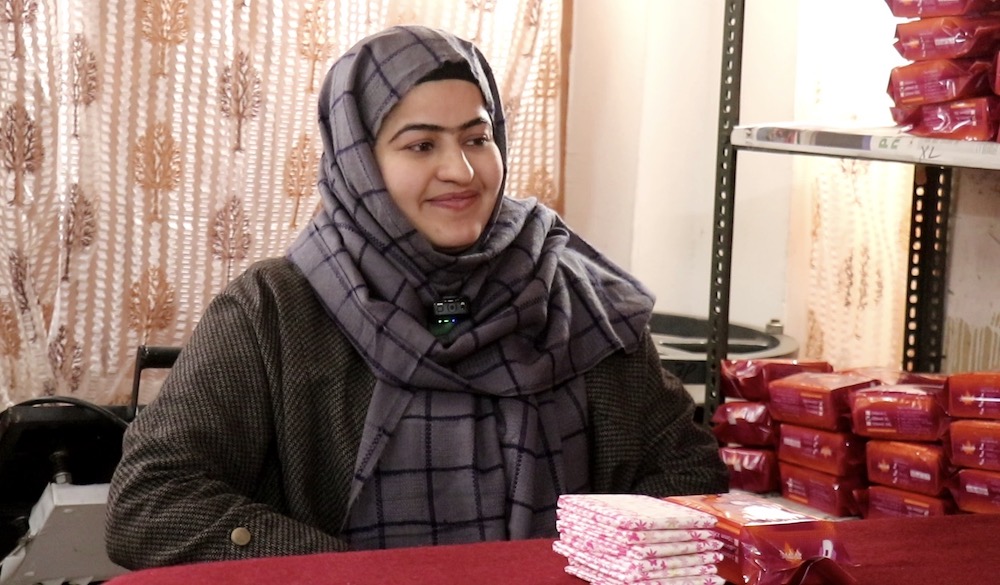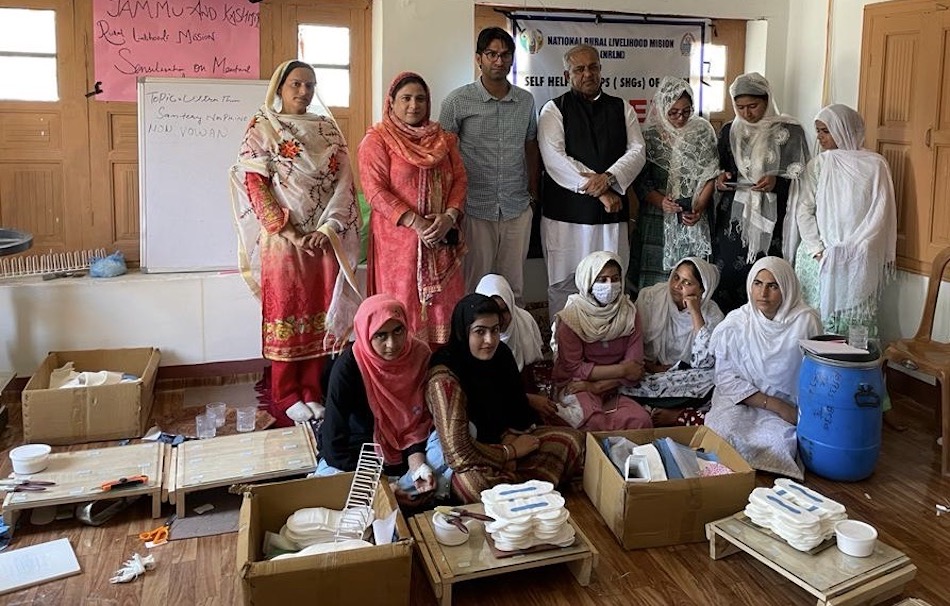In north Kashmir, Syed Shadab Ali Gillani met a young lady who heads a group that manufactures hygienic napkins for women’s care with institutional support
Razia Farooq, known locally as Rosie, is a trailblazer in her community. Hailing from Shahgund (Hajin), she joined Self Help Groups (SHGs) in 2019, which actively works on projects for positive change. Since then, Razia has dedicated herself to these groups, finding purpose and meaning within them.
With ten other young women, Razia set up Shining Star in 2022, to address unemployment creatively. Instead of opting for a conventional boutique or a salon, they floated Rahat, a brand exclusively for a product range crafted for the personal use of women. It was conceived by the Global Initiative of Academic Networks (GIAN) which also contributed to training the group of young women.
Registering The Brand
They crossed the first milestone on August 3, 2022, when the brand was formally registered. In the quick follow-up, Rahat’s product underwent rigorous laboratory tests in Srinagar and Mumbai, both achieving a spotless 100 per cent clean result. It then got into the manufacture and marketing of personal hygiene products.
The team distributed free samples to girls in self-help groups to garner authentic feedback and promote their ideas.
“Feedback was positive,” Razia said. “We soon started working with cooperative supermarkets in crucial locations, including Srinagar, Baramulla, and Budgam.”

Rahat products are now available on the shelves of cooperative supermarkets. Yet, the journey hasn’t been easy, especially in reaching far-off places where there is a high demand for sanitary napkins among women.
The initiative was initially funded by the National Rural Livelihoods Mission (NRLM), which runs the Umeed Scheme which is an SHG. The scheme holds groups which work for women’s empowerment and self-employment while having a focus on society’s crucial needs.
Production Process
To make sure their products are top-notch, they do thorough lab tests every day.
Right now, the group make 200 packets of this product every month. Every packet has seven pieces. Sometimes, however, when they get an order, they go up to 500 packets. The installed capacity of the plant is 7000 pieces a month. “The good feedback we have gotten over the years makes us even more committed to bringing these sanitary pads to more people,” Razia said. “Our product recently got a precision certificate. We are proud of our packaging, which meets both national and international standards.”
Even though it may seem like there’s not much demand, they have met all the requests. “Now, the challenge is to distribute these products effectively,” explains Razia, the business’s founder.
Marketing and Distribution
To tackle the distribution challenge, Razia personally took charge of marketing. She visited supermarkets and other markets in different places in Budgam, Baramulla, and Srinagar. “While the listed price is Rs 40, we sell it for Rs 30, making it affordable for customers and ensuring a fair profit margin for sellers.”
The raw materials for the business come from Mumbai, and Razia secures it through her mentor, Sheikh Afzal. The process of getting materials involves costs for raw stuff and machinery, and we are thankful for the support from different departments”. At the beginning, “we had extra expenses like renting a hall and electronic fittings.”
Help Came
As Razia started the initiative, institutions were around. After the Army saw the group working better, they chipped in and gave them part of a wide range of machines that would enable them to manufacture the product. The rest of it was done by the NRLM. They have an entire range of machines with a power supply and a generator as well.
Still, the group faced challenges in the market.

Even though the business has been running for a year and a half, it hasn’t made big profits. “Right now, I’m concentrating on selling the product and giving out free samples for feedback,” Razia said. “I believe in the quality, and if customers like it, I trust that success will come.”
Razia said they are still in the initial phase but whatever they earn they equally distribute among 11 members of the group. “It is marginal income but we believe it will go up once the market improves,” she said. “Last time, we got a good order from Bandipore and when we had better orders, we worked overtime.”
Aspirations
Given the fact that using hygienic products is still an urban phenomenon, the group has to work overtime to make women understand the importance of the change they have to bring about. Unhygienic products used in personal care often lead to infections, which eventually take some of the women to the hospitals.
“Even if we do not make money right away, spending time on staying clean is a crucial step for our long-term health,” Razia said. Razia acknowledges the reality. “Talking about it openly in public, like at the market, is often tough. Many women face difficulty getting the supplies they need discreetly.” To make the process smoother, she creates a platform encouraging women to confidently share their need for sanitary pads. “No need to be embarrassed; if you ever find yourself in that situation, just let me know. I used to feel hesitant too, but I’ve overcome that fear.”
Razia is no longer scared of dealing with male distributors. “Now, I am committed to seeing my business grow and reach across Jammu and Kashmir. Insha’Allah, it will happen.”
The post Razia’s Rahat appeared first on Kashmir Life.
from Kashmir Life https://ift.tt/wp3ytMr
via IFTTThttps://ift.tt/3rPUxaS
No comments:
Post a Comment